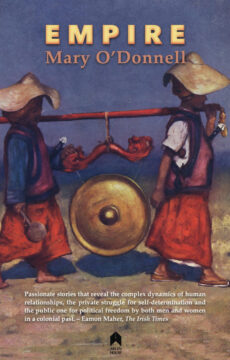by Dick Edelstein
 A number of books published in Ireland in the past few years relate to the centenaries of the First World War and the fight for Irish independence. Apart from being an opportunity to sell books, the conjuncture afforded readers an opportunity to reflect while delving into a receding page of history. Mary O’Donnell’s narrative collection Empire includes interlinked short stories dealing with the revolutionary period, along with a novella-length title piece. Notwithstanding its historical tie-in and informative potential, the true raison d´être of this book is the pleasure of reading.
A number of books published in Ireland in the past few years relate to the centenaries of the First World War and the fight for Irish independence. Apart from being an opportunity to sell books, the conjuncture afforded readers an opportunity to reflect while delving into a receding page of history. Mary O’Donnell’s narrative collection Empire includes interlinked short stories dealing with the revolutionary period, along with a novella-length title piece. Notwithstanding its historical tie-in and informative potential, the true raison d´être of this book is the pleasure of reading.
All of the stories are eminently readable, as we can clearly see in the title piece. During the First World War, the Wheelers, an Irish newlywed couple, travel to Burma, where the husband takes up an engineering job with a British company on a three-year contract. Separately, both of the protagonists become aware of their growing distaste for the prevailing colonialist attitude towards the local population, and both in the end are compelled to reflect on their own sense of identity, but in very different ways.
The spare writing vibrates with unstated meaning as the narrator’s tone mirrors the characters’ circumspect manner of speech. We can almost hear their inner dialogue as they delicately choose what to communicate to each other and what to leave unsaid. Gaps left by unspoken thoughts cast shadows of social norms and propriety, highlighting the contrasting postures of men and women imposed by the social roles they feel obliged to embody. Whether the characters’ modulated diction is informed by historical research or by the author’s poetic sensitivity to language, the verisimilitude of the portrayal is palpable, and it is reinforced by a carefully created atmosphere. Craft is concealed by art, as when viewing a finely painted image whose effect we perceive immediately without discerning the brush strokes. Read more »
